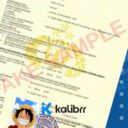Commonly Used Terms and Phrases in Job Descriptions

Dynamic work environment. Proven track record. Self-starter. You see these words on job ads often, and being aware of what these imply can help you better understand the jobs you are applying for, as well as help you when you’re writing your resume
Whether you’re viewing career opportunities directly listed on Kalibrr or viewing the jobs syndicated on Facebook, LinkedIn, or Indeed, you’ve probably noticed how some phrases and acronyms are commonly used across most the listings. There isn’t really anything wrong about the use of these terms, but confusion also usually arises because some of these can be a little vague, if not a bit technical.
Like anyone taking their careers seriously, recruitment professionals and the human resources industry in general are surely doing their best to write good job descriptions. However you’ll also still have to pardon them as they’ve also been at their jobs for a long time, and don’t realize that their “jargon” still aren’t regular words for everyone. Then there’s the matter of the immense competition for talent, such as yourself, and to stand out seemingly means to include buzzwords and cliches in their job posts to get your attention.
In these instances, it’d be good to have a handle on some commonly used terms in job descriptions to help you avoid missing out on great job opportunities, or help prevent your walking into a job without the right set of expectations, as well as help you avoid the habit of using these words when describing your previous work.
TOPICS
‘Self-starter’
When a job ad lists this, it basically means the employer wants somebody who is motivated, driven and independent, all three of which are actually better words to have used on the ad than ‘self-starter’ (keep these in mind when you’re tempted to describe yourself as a ‘self-starter’ on your resume, too).
While ‘self-starter’ isn’t quite a term to misunderstand, it may strike some as odd that this is still listed, because motivation, drive, and independence should be given for any job, right? In these instances, the employer may likely just be emphasising how much they desire someone with initiative or the ability to work independently.
‘Streamline/streamlining’
If you’ve noticed, this is a term that is used rather often in job descriptions, yet is better saved for corporate communications. In the business context, ‘streamline’ or ‘streamlining’ usually refers to making an organization, department, or system more efficient and effective by implementing faster or simpler working methods.
This often appears on job ads of the managerial or supervisory variety, because leaders are indeed usually among those tasked to head the ‘streamlining’ of certain aspects of a company. Still, the term can be vague and lacking in detail, so it’s best to ask during your interview what exactly does the ‘streamlining’ that the employer wants done entails.
In the same extent, avoid using this in your resume, and instead be more descriptive of how you helped your prior employer improve (i.e. “Developed a new scheduling scheme to address staffing issues, which helped increase productivity, and reduce overhead by 10-percent.”)
‘Dynamic work environment’
By definition, ‘dynamic’ means progress, activity and change. In essence, about every workplace is ‘dynamic’. So why do employers keep including these in their job ads? Well, they expectedly want to appeal to you, and who would not be intrigued by the promise of working in a place where you’ll have an engaging journey and a positive future.
Just be wary when the term is seemingly used on everything else along with the work environment. Be it to join a “dynamic team”, or work for a “dynamic company”, overuse of this term shows an employer (or at least a recruiter) that is in a company not quite sure of its footing, and may not be the best place to work if it indeed is still navigating its place in its industry.
‘Liaise with (insert supervisor, manager, or any other executive here)’
While ‘communicate’, ‘interact’ or ‘work alongside’ are easier to understand, and undoubtedly easier on the eyes and ears, for some reason there are employers who still prefer to use ‘liaise’ instead. This is usually just for emphasis, as more often than not, those who ‘liaise’ are those who do so with supervisors, managers, vice-presidents, or CEO, or anyone else with a prominent position in the company.
If not pretentious, ‘liaise’ can at least be considered jargon, which essentially makes us unfamiliar with terms and tasks we are familiar with. So it’s just dressing words up in a corporate disguise, and we shouldn’t allow these to make us feel inadequate and incapable of acquiring the role. At the same time, don’t use this on your resume, because as much a some recruiters habitually use this on job descriptions, others will see you as trying to overcompensate with the use of, again, a considerably pretentious yet funny-sounding word.
Buzz words galore
To make the job ad seem exciting, some recruiters use words such as ‘rock star,’ ‘guru,’ ‘ninja,’ ‘wizard,’ and many others on job titles and job descriptions. Sure, albeit kind of cheesy, these words sometimes look good on blogs (and resumes) and may indeed describe great personalities or captivate readers.
However, it is also important to be wary of job ads using them, as such buzz words not only not help give you a better idea of what the job is about, and also reeks of desperation, where the employer really wants to attract someone, anyone, to the role. Many a time, ‘rock star’ has turned out to be ‘one-man-band’, where one employee took on the responsibility of a whole department. To avoid these, and other scenarios, ask the employers exactly what the role is beyond the flashy title, if not, just look for roles that are more professionally titled and described.
Don’t use these on your resume either, unless you want the recruiter asking you to belt out in song because you described your prior role as ‘rockstar’, or asking you where your wand is because you indicated you were a ‘wizard’ at your prior company.
Have any other job ad or resume terms that you think should be on this list? Then let us know at Kalibrr!
Kalibrr is a technology company that aims to transform how candidates find jobs and how companies hire talent. Placing the candidate experience at the center of everything it does, the company continues to attract the best talent from all over, with more than 2 million professionals and counting. Kalibrr ultimately connects these talents to companies in search of their next generation of leaders.
The only end-to-end recruitment solutions provider in Southeast Asia, Kalibrr is headquartered in Makati, Philippines, with offices in San Francisco, California and Jakarta, Indonesia. Established in 2012, it has served over 18,000 clients, and is backed by some of the world’s most powerful start-up incubators and venture capitalists. These include Y Combinator, Omidyar Network, Patamar Capital, Wavemaker Partners, and Kickstart Ventures.
Need help finding that dream job? Sign up at Kalibrr and be connected to thousands of employers! For application help and additional professional advice, follow on Kalibrr Facebook, Twitter, LinkedIn, and Instagram.





Belum ada komentar yang tersedia!